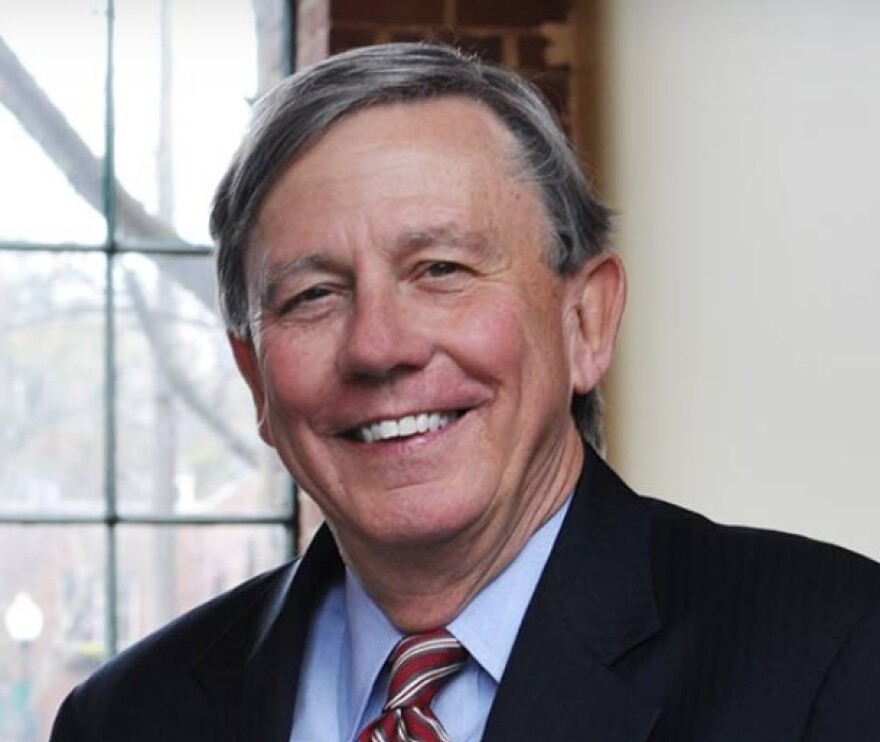A judge has ruled that the family of Andrew Brown Jr. will be able to view police body camera video of his fatal shooting, but the video will not be immediately released to the public. In Wednesday's ruling, Judge Jeffrey Foster said he believed the video could hamper an ongoing investigation or threaten the safety of those caught on tape.
Joining WFAE's "All Things Considered" host Gwendolyn Glenn to discuss the ruling is Charlotte media law attorney Jonathan Buchan. For disclosure, he is a former WFAE board president and has represented the station.
Gwendolyn Glenn: Thanks for joining us, John.

Johnathan Buchan: Glad to be here.
Glenn: John, Judge Foster ruled that the family can see the video within 10 days, but it will stay out of the public view for at least 30 days. What is your opinion of this ruling?
Buchan: There's no appellate law on this anywhere in the state. So look at what other trial judges around the state have done. In Mecklenburg County, I will say that our trial judges have been pretty demanding when the DA's office has asked for substantial delays. They require them to be specific about why they need so much time. Do you have a lot of witnesses you need to interview, for example? Why can't you do that in a week as opposed to 10 days?
But I will say that around the state there have been — from the time of the initial event to the time of release — there has been two weeks, sometimes longer than that, even in my experience here.
Glenn: Now, have you heard of a video not being released immediately in a case like this?
Buchan: Well, sure. It's been very seldom until just recently that the media have immediately asked for it. Sometimes it's taken a week or so. It been hard for national media to understand this, but our statute requires notice to various people and then a hearing before a judge and only the judge can allow the release of this.
So there's usually, you know, 10 days or so that passes before a hearing. And then usually the judge is going to give the DA time — at least a week or so — to finish up whatever investigation they've got, unless they can show that they really need even more time than that.
Glenn: Now, you mentioned the media. I understand that the judge said the media has no legal standing here. What did he mean by that?
Judge says media organizations don’t have standing to request the video.
— Sarah McCammon📻 (@sarahmccammon) April 28, 2021
Buchan: Well, the statute's very specific about who can request the release of such body cam or dash cam videos. It's very clear what the statute says. And I'll just tell you by quote: "Any person requesting release of a recording may file an action in the Superior Court seeking release." And that means any member of the public. You, me, the news media can make that petition.
So I don't understand where that interpretation of the statute comes from. And let me be clear: I think that interpretation is flat wrong and erroneous.
Glenn: OK, now, in this case, the Pasquotank County sheriff asked for the video to be released while District Attorney Andrew Womble argued that it would harm an investigation into the shooting. The judge agreed. Do you think releasing the video could hurt the investigation?
Buchan: In theory, at least for a brief period of time, the law enforcement folks are doing the investigation. The DA's office needs to have the opportunity to get interviews with the witnesses to find out what they've got to say. But in the end, that should not take — unless you've got dozens and dozens of witnesses — there's no reason for that not to happen very quickly.
In Mecklenburg County, I know the judges have frequently directed the DA to finish such an investigation promptly and put a deadline to say "These videos are going to be released on such and such a date. Get your investigation done before that date." They've been very demanding that the DA be precise about why they need a certain amount of time.
Glenn: The judge also said today that he had concerns for the safety of those in the video. What are the risks, both socially and legally, in releasing the video in terms of that?
Buchan: For one thing, if he really does, the DA really does have some evidence and some real strong reason to believe that there would be danger to people who are shown in the video, you could find ways to blur the images for the time being. But there's going to come a time when the people who were at the scene, the police officers' names, are going to be public. There's no way around that. So I'm not sure why delaying the release 30 days is going to accomplish protecting their safety. But perhaps the DA has information that I, of course, don't.
Glenn: Well, John, thanks for talking with us.
Buchan: Thanks. Glad to be here.
Jonathan Buchan as a media law attorney in Charlotte.


